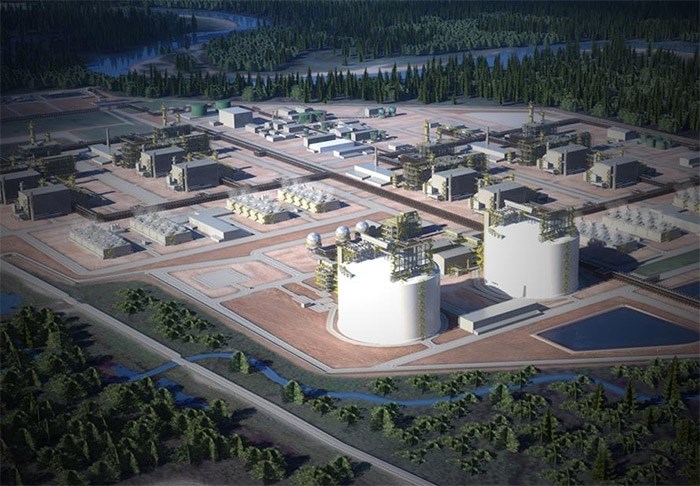 Rendering shows liquefied natural gas export terminal at Kitimat as proposed by a consortium led by Shell and which includes Korean Gas Corp., Mitsubishi and PetroChina. | LNG CANADA
Rendering shows liquefied natural gas export terminal at Kitimat as proposed by a consortium led by Shell and which includes Korean Gas Corp., Mitsubishi and PetroChina. | LNG CANADA
A $40 billion liquefied natural gas (LNG) plant proposed for Kitimat is still very much alive, says the CEO of LNG Canada—but senior governments may need to address tax competitiveness before Shell and its three partners can make a final investment decision.
“I actually believe that B.C. will have an LNG industry, that there is societal support for an LNG industry from B.C. and … I believe specifically the LNG project can and will happen in B.C.,” Andy Calitz told Business in Vancouver, following an address to the Greater Â鶹´«Ă˝Ół»Board of Trade (GVBOT) September 22.
LNG Canada is a joint venture company composed of the four global energy companies that have proposed the Kitimat project.
Michelle Mungall, the BC NDP’s new minister of energy, mines and petroleum resources, seemed to share Calitz’s optimism, and said her government is considering some of the concerns the consortium – Shell, Mitsubishi, Korean Gas Corp. and PetroChina – has expressed about moving forward.
“Our position has always been supportive of LNG, as long as the industry meets our four conditions,” Mungall told reporters in a scrum after Calitz’s address. “And what I think is important to remember is that conditions are not roadblocks; they’re road maps.”
A current glut of LNG on the market, much of it from new LNG plants in Australia, has whittled global LNG prices in half from what they were in 2013, when many of the big players, including Shell, were entering regulatory processes.
But demand continues to grow in Asia, and there are new LNG markets developing in India, Indonesia and Pakistan, meaning there will eventually be a demand for more LNG plants.
But Shell, which has LNG projects on the drawing board in practically every time zone, has made it clear that it will invest only in projects that are competitive.
“We do need to address, on a broader scale, what’s going on in terms of the global marketplace and [the question is]: is B.C. competitive in this global marketplace as it stands right now?” Mungall said. “I’ve directed my ministry to look into that and to begin to work with First Nations, local communities, as well as the industry.”
Following the announcement that two other major LNG projects – by Petronas and Nexen Energy and proposed for Prince Rupert – had been cancelled shortly after the NDP government took power, there was speculation that Canada had missed the boat on an LNG industry.
“I don’t believe that Canada has missed that boat,” Calitz told GVBOT members.
Unlike the cancelled projects, both the LNG Canada plant itself and the associated Coastal GasLink natural gas pipeline are fully permitted. The project also has the support of First Nations in the Kitimat region, notably the Haisla.
Calitz said the Petronas and Nexen decisions have both positive and negative implications for the LNG Canada project.
“It strengthened the voices of both the critics and naysayers that say there will be no LNG from B.C. or there should be no LNG from B.C.,” Calitz said.
Among those naysayers is BC Green Party leader Andrew Weaver.
On the positive side, Calitz said that the 40 contractors bidding on contracts to build the plant now have less competition for scarce skilled labour.
Calitz reiterated what are often cited as two competitive advantages that B.C. has as a potential LNG developer: proximity to Asian markets and one of the largest, most productive natural gas plays in the world – the Montney in northeastern B.C.
Earlier this year, Shell divested itself of some of its natural gas assets in B.C., which raises the question of whether LNG Canada would have enough upstream supply for the two-train LNG plant the consortium wants to build in Kitimat. Calitz pointed out that Shell is not the only partner in the consortium with natural gas holdings in B.C.
“The four partners in LNG Canada … have enough gas supply to keep the energy trains full,” he said.
“The combination of the NDP [MLAs] and Liberal [MLAs] who support an LNG project and a new mega-industry for British Columbia is good enough for me to move forward in British Columbia,” Calitz said.
One of the biggest criticisms from the industry’s standpoint of the former Liberal government’s tax and royalty regime for LNG was a special LNG tax, which companies in regions like the U.S. and Australia do not pay.
“That is a subject we are discussing with the government,” Calitz said.


